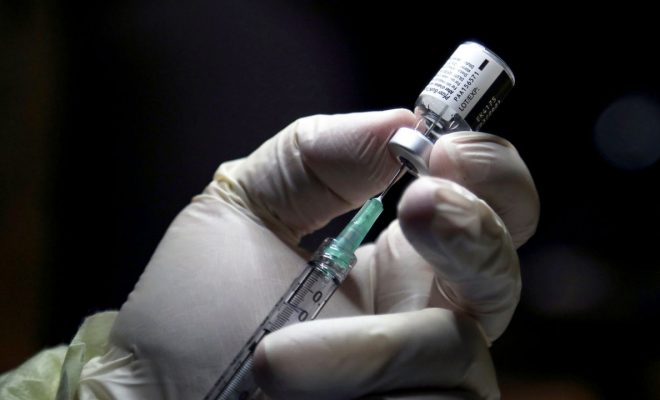Suspicions grow that nanoparticles in Pfizer’s COVID-19 vaccine trigger rare allergic reactions

Severe allergy-like reactions in at least eight people who received the COVID-19 vaccine produced by Pfizer and BioNTech over the past 2 weeks may be due to a compound in the packaging of the messenger RNA (mRNA) that forms the vaccine’s main ingredient, scientists say. A similar mRNA vaccine developed by Moderna, which was authorized for emergency use in the United States on Friday, also contains the compound, polyethylene glycol (PEG).
PEG has never been used before in an approved vaccine, but it is found in many drugs that have occasionally triggered anaphylaxis—a potentially life-threatening reaction that can cause rashes, a plummeting blood pressure, shortness of breath, and a fast heartbeat. Some allergists and immunologists believe a small number of people previously exposed to PEG may have high levels of antibodies against PEG, putting them at risk of an anaphylactic reaction to the vaccine.
Others are skeptical of the link. Still, the U.S. National Institute of Allergy and Infectious Diseases (NIAID) was concerned enough to convene several meetings last week to discuss the allergic reactions with representatives of Pfizer and Moderna, independent scientists and physicians, and the Food and Drug Administration (FDA).
NIAID is also setting up a study in collaboration with FDA to analyze the response to the vaccine in people who have high levels of anti-PEG antibodies or have experienced severe allergic responses to drugs or vaccines before. “Until we know there is truly a PEG story, we need to be very careful in talking about that as a done deal,” says Alkis Togias, branch chief of allergy, asthma, and airway biology at NIAID.
Pfizer, too, says it is “actively seeking follow-up.” A statement emailed to Science noted it already recommends that “appropriate medical treatment and supervision should always be readily available” in case a vaccinee develops anaphylaxis.
Anaphylactic reactions can occur with any vaccine, but are usually extremely rare—about one per 1 million doses. As of 19 December, the United States had seen six cases of anaphylaxis among 272,001 people who received the COVID-19 vaccine, according to a recent presentation by Thomas Clark of the U.S. Centers for Disease Control and Prevention (CDC); the United Kingdom has recorded two. Because the Pfizer and Moderna mRNA vaccines use a new platform, the reactions call for careful scrutiny, says Elizabeth Phillips, a drug hypersensitivity researcher at Vanderbilt University Medical Center who attended an NIAID meeting on 16 December. “This is new.”
News reports about the allergic reactions have already created anxiety. “Patients with severe allergies in the US are getting nervous about the possibility that they may not be able to get vaccinated, at least with those two vaccines,” Togias wrote in an invitation to meeting participants. “Allergies in general are so common in the population that this could create a resistance against the vaccines in the population,” adds Janos Szebeni, an immunologist at Semmelweis University in Budapest, Hungary, who has long studied hypersensitivity reactions to PEG and who also attended the 16 December gathering.
Scientists who believe PEG may be the culprit stress that vaccination should continue. “We need to get vaccinated,” Phillips says. “We need to try and curtail this pandemic.” But more data are urgently needed, she adds: “These next couple of weeks in the U.S. are going to be extremely important for defining what to do next.”









